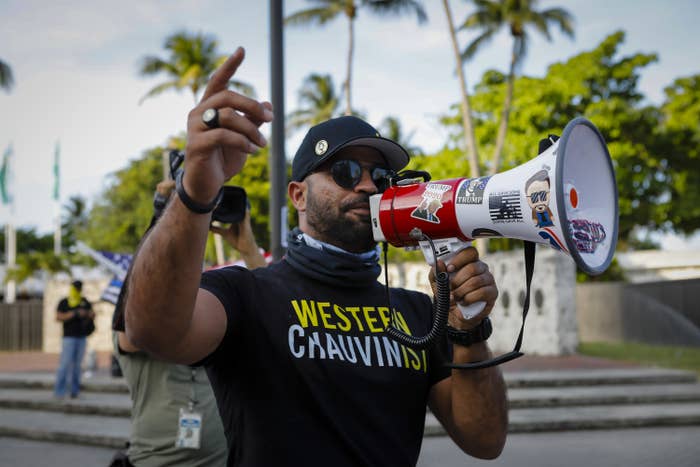
WASHINGTON — Henry “Enrique” Tarrio, the former national chair of the Proud Boys charged with orchestrating a conspiracy to attack the US Capitol during the Jan. 6 insurrection, will stay in jail while his case goes forward, a judge in Miami ruled Tuesday.
The decision by a federal magistrate judge to keep Tarrio behind bars comes two months after he was released from jail in Washington, DC, where he’d served a 155-day sentence for pleading guilty to burning a stolen “Black Lives Matter” banner and illegally having a high-capacity firearm magazine in the District of Columbia. It wasn’t clear if he’d stay in a facility in Florida or be transferred back to DC.
The court did not permit reporters to observe or listen to the hearing remotely and no other details were immediately available. A spokesperson for the US attorney’s office in Washington confirmed US Magistrate Judge Lauren Louis' order. Tarrio will have the option of asking US District Judge Timothy Kelly in Washington, the judge who will be presiding over the case going forward, to reconsider Louis' decision.
A federal grand jury in DC returned an indictment earlier this month charging Tarrio and five other men identified as having various connections to the extremist group; some were leaders of their local chapters. They’re accused of planning well in advance of Jan. 6 to disrupt Congress’s certification of the Electoral College results, raising funds to travel, buying paramilitary gear, and coordinating via encrypted communication channels. Tarrio isn’t charged with going to the Capitol — he’d been ordered to leave the city a day earlier — but prosecutors allege he continued to direct the Proud Boys’ activities and urged them on as the attack unfolded.
In arguing to keep Tarrio in jail while his case went forward, prosecutors said he continued to be a danger to the community, might try to flee given the seriousness of the charges, and posed a risk of tampering with evidence and witnesses.
“A grand jury has found probable cause to believe that Tarrio was a lead orchestrator of [a] plot to corruptly obstruct, influence, and impede an official proceeding — specifically, a plot that included an attack on the Capitol while a Joint Session of Congress reviewed the election results. He encouraged the mob to stay in the building and suggested to close confidants that they should do it again. In so doing, Tarrio showed a contempt for the laws and Constitution of this country that make it impossible to trust that he would comply with any conditions fashioned by this Court for his release,” prosecutors wrote in a brief filed the day before Tuesday’s hearing.
The government argued Tarrio’s texts with other Proud Boys members showed “a leader who dictated a ‘command and control’ structure.” Prosecutors highlighted allegations from the indictment about Tarrio’s role in planning for the Proud Boys to go to DC for Jan. 6; his continued communication with his codefendants after he was arrested shortly before Jan. 6 on separate charges and ordered to leave; and his public and private messages cheering on the assault on the Capitol and claiming credit for it.
As police worked to clear out the Capitol a few hours after the initial breach, prosecutors said that a member of the Proud Boys sent a message to a group chat asking, “So what do we do now,” and Tarrio replied, “Do it again.”
Prosecutors noted Tarrio’s previous convictions, including a conspiracy case involving stolen diabetic test strips and his most recent case in DC. The day after Tarrio was arrested in Washington on Jan. 4, a judge released him and ordered him to leave the city. But prosecutors said that instead of immediately following that order, Tarrio first went to a 30-minute meeting in a parking garage with a group of people that included Oath Keepers founder Elmer “Stewart” Rhodes — more reason he couldn’t be trusted to comply with pretrial release, the government argued.
The government scoffed at what they described as “self-serving” statements that Tarrio made after Jan. 6, including to law enforcement and the media, trying to distance himself from the attack on the Capitol. They argued that he posed a “serious risk” of tampering with evidence or witnesses, citing evidence that he’d taken steps to stop investigators from accessing messages on his phone and that he’d urged other Proud Boys members not to “flip.”
Tarrio’s codefendants were all previously charged in connection with Jan. 6. They’ve lost efforts to get out of jail while their cases are pending, both before a district court judge and before the US Court of Appeals for the DC Circuit.
The appeals court has repeatedly held that allegations of advance planning and conspiracy to attack the Capitol, along with charges of assaulting police or being armed, are serious enough to keep defendants in pretrial detention in cases related to Jan. 6. Of the more than 625 defendants with active cases — not including people who pleaded guilty and have already been sentenced — roughly 80 are in custody, BuzzFeed News' analysis of court records shows.
